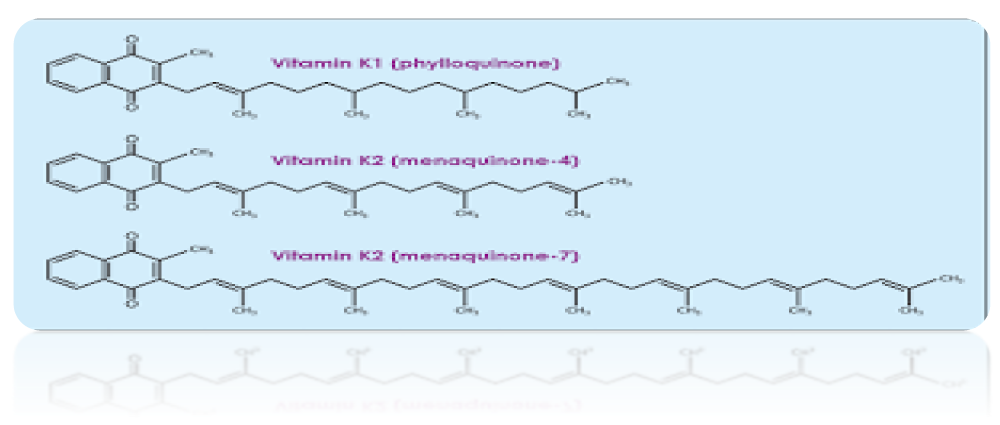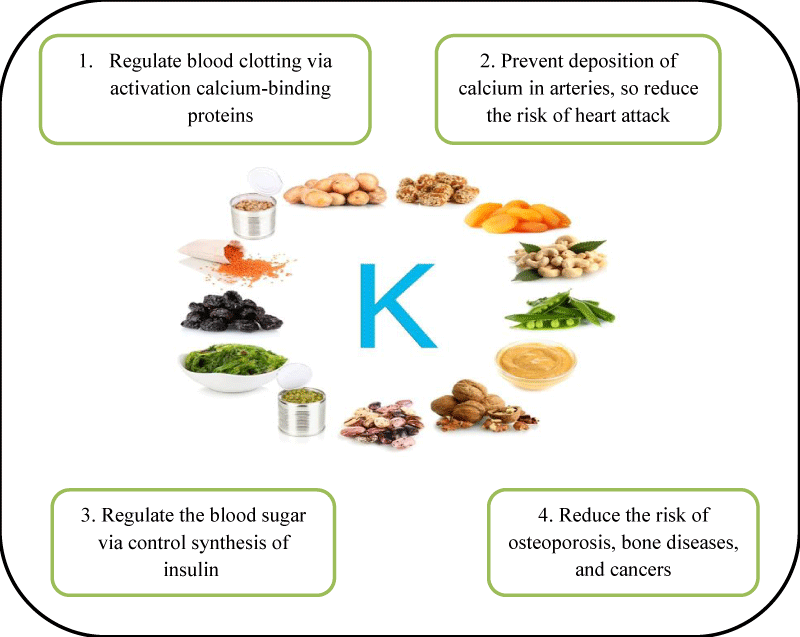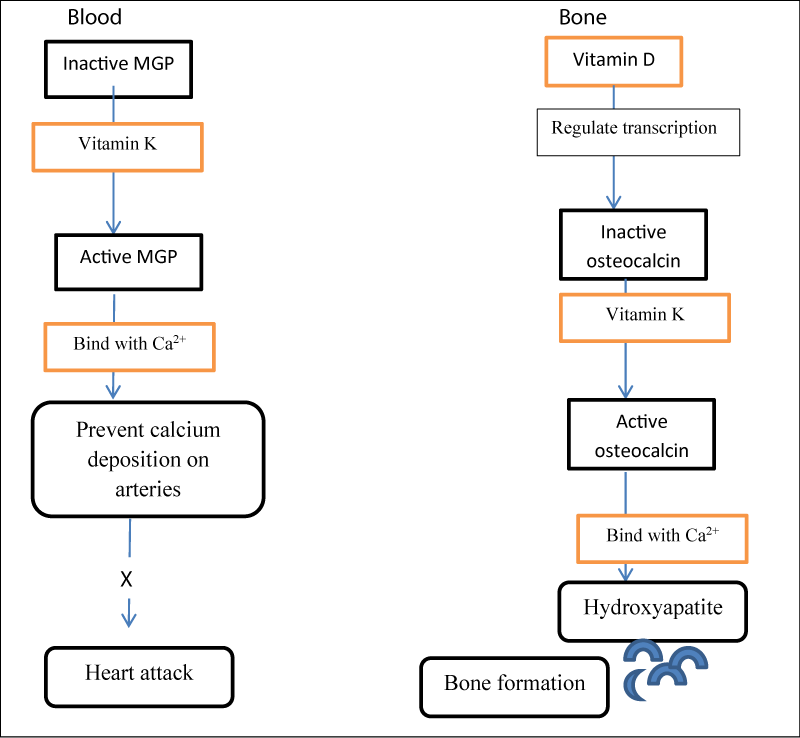Mini Review
Significant influence for vitamin K on different metabolic diseases according to positive effect on levels of both vitamin D, and calcium

Walaa Fikry Elbossaty*
Department of Chemistry, Biochemistry division, Faculty of Science, Damietta University, Egypt
*Address for Correspondence: Walaa Fikry Elbossaty, Department of Chemistry, Biochemistry Division, Faculty of Science, Damietta University, Damietta, Box 34517, Egypt, Email: [email protected]
Dates: Submitted: 27 March 2018; Approved: 04 April 2018; Published: 05 April 2018
How to cite this article: Elbossaty WF. Significant influence for vitamin K on different metabolic diseases according to positive effect on levels of both vitamin D, and calcium. Arch Biotechnol Biomed. 2018; 2: 008-011. DOI: 10.29328/journal.abb.1001010
Copyright License: © 2018 Elbossaty WF. This is an open access article distributed under the Creative Commons Attribution License, which permits unrestricted use, distribution, and reproduction in any medium, provided the original work is properly cited.
Keywords: Vitamin K, K1, K2; Osteoporosis; Heart attack
Abstract
Vitamin K was discovered as nutrient of blood clotting. There are two main types of vitamin K, vitamin K1, and vitamin K2. Although the structure of vitamin k is stable but also, there are differences between them. Vitamin k1 is mainly present in dark green leafy plant; while vitamin k2 present in animal and fermented plant. There are different sources of vitamin k. The normal human body is required about 200µg/day from vitamin k in both forms. Vitamin k1 can easily converted into vitamin k2.There is big difference between work of types of vitamin k, where each one responsible for special job. Vitamin k play important role in various metabolic process; vitamin k especially k2 play important role in protect the body from heart attack , in addition to reduce the development of osteoporosis and bone disease in combination with vitamin D and calcium. Vitamin k responsible for increase the secretion of male sex hormone and infertility. Vitamin k is consider one of the most important vitamin, it can save human from death as result of precipitation of calcium on arteries. Due to the importance of vitamin k, this article will discuss vitamin k, its presence, and role in different diseases.
Introduction
Vitamin K definition
Vitamin k was discovered in 1929, and it was called Koagulationsvitamin. There are two chief forms of Vitamin K; K1 (phylloquinone) is present in leafy greens, while Vitamin K2 (menaquinone) is present in animal foods and fermented foods. Vitamin K2 classified into various different subtypes, however the most significant ones are MK-4 and MK-7. All K vitamins are analogous in their structure: they contain a “quinone” ring; the several types of vitamin K are differing from each other according to the length and degree of saturation of the carbon tail and the number of “side chains”. The number of side chains is designated in the name of the particular menaquinone [1] (e.g., MK-4) Figure 1.
Sources of vitamin K
The most abundant form of vitamin K is Vitamin K1, which is mainly found in plant foods, particularly dark, leafy green vegetables. On the other hand Vitamin K2 is only present in animal foods and fermented plant foods as natto. Dietary sources of vitamin k are summarized in the following Table 1 [2]. There is no recognized toxicity accompanying with high doses of vitamin K2. Unlike the other fat-soluble vitamins, vitamin K is not stored in any significant quantity in the liver. Many researches demonstrate that vitamin K has no dangerous effects on human healthy. Production of vitamin K is synthesis of menaquinone in the large intestine by bacteria [4].
| Sources | Dairy Value/100g [3] | Kale | 817 | Mustard Greens | 593 | Swiss Chard | 830 | Collard Greens | 407 | Natto | 1103 | Spinach | 483 | Broccoli | 141 | Brussels Sprouts | 140 |
| Beef Liver | 106 | Pork Chops | 69 | Chicken | 60 | Egg Yolk | 34 | Cheddar | 14 | Avocado | 21 | Blackberries | 20 | Walnuts | 2.7 |
Mechanism action of vitamin K
Once dietary fat is taken, vitamin K is absorbed from the small intestine and transported via chylomicrons in the circulation. Furthermost of vitamin K is carried by triacylglycerol-rich lipoproteins and rapidly cleared by the liver; while only a small amount is released into the circulation and carried by LDL and HDL. After that vitamin K1 transport through blood stream in to liver where it used in activation calcium-binding proteins involved in blood clotting. On the other hand vitamin K2 play important role in activation of calcium bound protein which responsible for transfer calcium in to bones and prevent its deposition in arteries this protect the body from kidney stone formation and help in synthesis of good bones. In addition to vitamin K2 assist in synthesis of insulin and increase the sensitivity to it so protect the body from diabetes. Also, it increases secretion of male sex hormone as testosterone and fertility. Finally it protects from cancer by inhibition of genes responsible for development of cancers [5] Figure 2.
Interaction between vitamin K2 and heart disease
Cardiovascular disease is the world’s most common reason of death. It killed 14 million people in the year 2012 alone. The main reason in heart disease is deposition of calcium on heart arteries. So ant thing prevent predisposition of calcium decrease the risk of heart disease [6]. Vitamin K2 prevents the deposition of calcium on arteries; hence reduce the risk of heart disease. Rotterdam study was showed that the highest intake of Vitamin K2 was reduced the development of arteries calcification in about 52%, and lower risk of dying from heart disease in 57%. On the other hand, vitamin K1 had no influence on heart disease [7].
Interaction between vitamin K2 and risk of Osteoporosis
Osteoporosis is a mutual problem in different countries. It is especially common among post-menopausal women and increase risk of bone fractures. Vitamin K2 plays a vital role in calcium metabolism, the foremost mineral found in bones. Vitamin K2 activates the calcium-binding proteins such as Matrix gla protein and osteocalcin, which assistance to build and maintain bones [8]. A 3-year trial in 244 postmenopausal women found that those taking vitamin K2 supplements had much slower decreases in age-related bone mineral density [9].
Several studies reported that vitamin K2 reduced spinal fractures by 60%, hip fractures by 77% and all non-spinal fractures by 81%. In line with these conclusions, the Japanese officially recommend vitamin K supplementation for the prevention and treatment of osteoporosis [10].
In addition to, vitamin K2 play vital role in maintenance of dental healthy through activation of osteocalcin which activates a mechanism that stimulates growth of new dentin, which is the calcified tissue underneath the enamel on your teeth [11].
Interaction between vitamin K2 and cancer
Several studies have been done on Vitamin K2 and certain types of cancer. Two clinical trials recommended that vitamin K2 reduces recurrence of liver cancer and increases survival times. Other study on 11,000 men indicated that a high vitamin K2 intake was lower risk of advanced prostate cancer by 63%. While Vitamin K1 had no effect [12].
Interaction between Vitamin K2, Vitamin D, and Calcium
Vitamin D is a critical nutrient for optimal health and is best source is sun exposure. Vitamin D plays a vital role in bone synthesis where it responsible for increases the rate of absorption of calcium, the main mineral in bones. Both vitamins D and K Work as a team. Vitamin K regulates calcium in your body in at least two ways:
1. Promotes calcification of bone: Vitamin K activates osteocalcin, a protein that promotes the accumulation of calcium in your bones and teeth.
2. Reduces calcification of soft tissues: Vitamin K activates matrix GLA protein, which prevents calcium from accumulating in soft tissues, such as the kidneys and blood vessels.
In the absence of vitamin K2 vitamin D increase the rate of calcium absorption and this lead to accumulation of calcium on arteries and then heart attack and suddenly death. On the other hand, in the presence of vitamin K2 calcium is transported in to muscle to make bones. Vitamin K2 keeps the calcium in its right place Figure 3 [8].
Conclusion
According to this review we found that there is strong correlation between metabolic process of bone mineralization and vitamin K especially vitamin K2. So, deficiency of Vitamin K2 has a role in raising the risk of development of some metabolic diseases as heart disease, bone fracture, and cancer. As a result vitamin K2 supplements must be recommended in some people who have the predisposition for these diseases to diminish the rate of suddenly death. Several studies on vitamin K2 importance are needed in the near future.
References
- Shearer MJ, Newman P. Recent trends in the metabolism and cell biology of vitamin K with special reference to vitamin K cycling and MK-4 biosynthesis. J Lipid Res. 2014; 55: 345-362. Ref.: https://goo.gl/KE8bkX
- Nutrition facts, calories in food, labels, nutritional information and analysis. Nutrition Data. 2008.
- Guidance for Industry: A Food Labeling Guide (14. Appendix F: Calculate the Percent Daily Value for the Appropriate Nutrients)". US Food Drug Administration. 2013.
- Vitamin K. Dietary Reference Intakes for Vitamin A, Vitamin K, Arsenic, Boron, Chromium, Copper, Iodine, Iron, Manganese, Molybdenum, Nickel, Silicon, Vanadium, and Zinc. National Academy Press. 2001; 162-196. Ref.: https://goo.gl/W3xsWc
- Yuelei Z, Junhui Y, Hao D, Changqing Z. Vitamin K2 Ameliorates Damage of Blood Vessels by Glucocorticoid: a Potential Mechanism for Its Protective Effects in Glucocorticoid-induced Osteonecrosis of the Femoral Head in a Rat Model. Int J Biol Sci. 2016; 12: 776-785. Ref.: https://goo.gl/X5m8he
- Maresz K. Proper Calcium Use: Vitamin K2 as a Promoter of Bone and Cardiovascular Health. Integr Med (Encinitas). 2015; 14: 34-39. Ref.: https://goo.gl/qex1wt
- Hartley L, Clar C, Ghannam O. Vitamin K for the primary prevention of cardiovascular disease. Cochrane Database Syst Rev. 2015; 9: CD011148. Ref.: https://goo.gl/vRYZp9
- Katarzyna M. Proper Calcium Use: Vitamin K2 as a Promoter of Bone and Cardiovascular Health. Integr Med (Encinitas). 2015; 14: 34-39. Ref.: https://goo.gl/BcJFnq
- Vicky T, William L, Andrew G. Calcium intake and bone mineral density: systematic review and meta-analysis. CCBYNC Open access Research Calcium intake and bone mineral density: systematic review and meta-analysis. BMJ. 2015; 351. Ref.: https://goo.gl/yz6GcG
- Elaine Y, Annie W. Osteoporosis in East Asia: Current issues in assessment and management. Osteoporosis and Sarcopenia. 2016; 2: 118-133. Ref.: https://goo.gl/TAsBV7
- Jan O, Maria A, Gaute F, Havard H , Harald O. Vitamin K2 and its Impact on Tooth Epigenetics. Book edited by Jan Oxholm Gordeladze. 2017. Ref.: https://goo.gl/HXVt5z
- Vance TM, Su J, Fontham ET, Koo SI, Chun OK. Dietary Antioxidants and Prostate Cancer: A Review. Nutr Cancer. 2013; 65: 793-801. Ref.: https://goo.gl/fKu7Px



